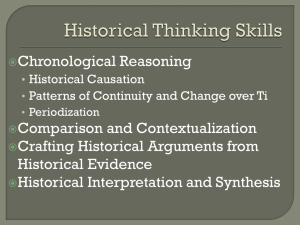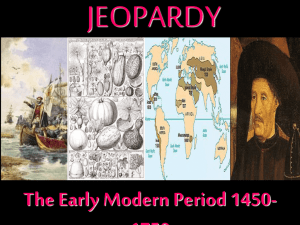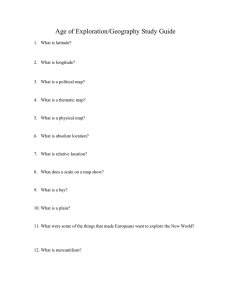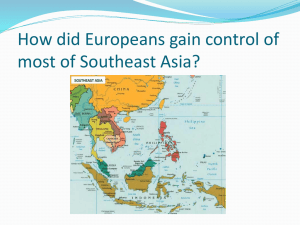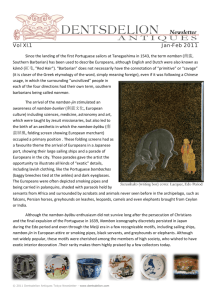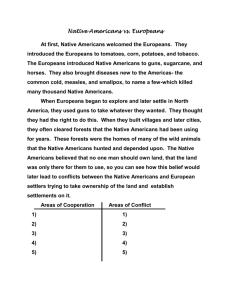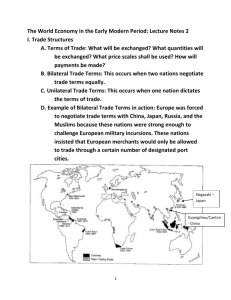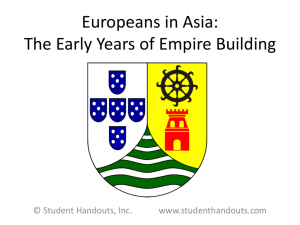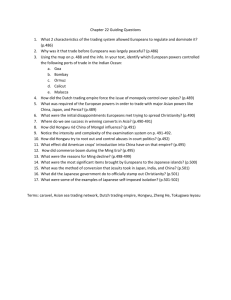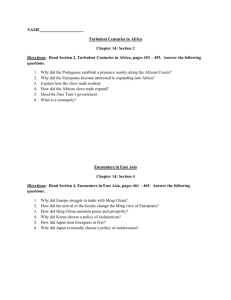THE WORLD ECONOMY EXCHANGES, CAPTIALISM, COLONIALISM, AND EMPIRE
advertisement
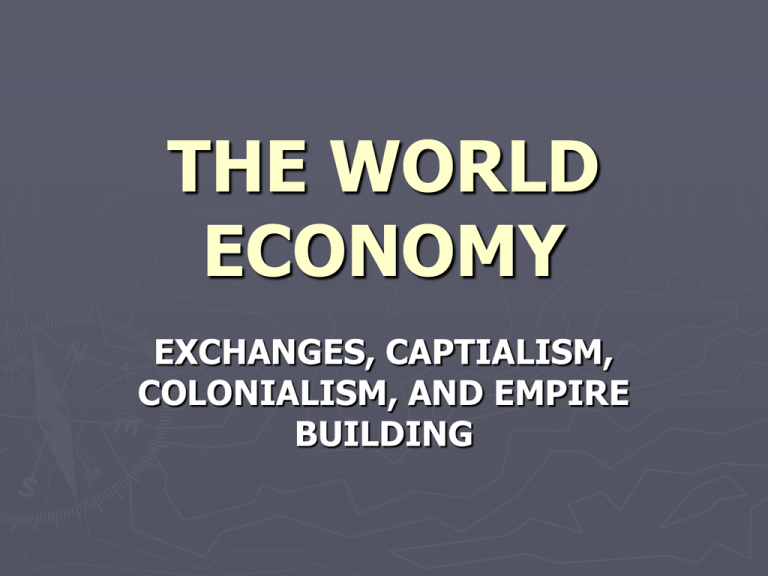
THE WORLD ECONOMY EXCHANGES, CAPTIALISM, COLONIALISM, AND EMPIRE BUILDING VOYAGES OF EXPLORATION ► Christopher Columbus, Genoese mariner Proposed sailing to Asian markets by a western route Sponsored by Catholic kings of Spain; sailed to Bahamas in 1492 ► Columbus's voyage inspired others England, France, Holland begin to explore Spain, Portugal sent out more expeditions, conquistadors OTHER VOYAGES ► Ferdinand Magellan, Portuguese navigator, in service of Spain Crossed both the Atlantic and Pacific Oceans 1519-1522 ► Exploration of the Pacific took three centuries to complete Trade route between the Philippines and Mexico, by Spanish merchants Other European mariners searched for a northwest passage from Europe to Asia ► The English, French, Dutch France: Explored Northern North America, Settled Canada, exploited furs English ► ► Atlantic seaboard of North America, Hudson Bay area English East India Company opened Indian Ocean to English trade Dutch ► ► ► ► Tended to prey on Spanish, Portuguese existing holdings Won independence from Spain, seized control on much of Indian Ocean Dutch East India company established to exploit Indian possessions By 18TH century, Europeans had accurate knowledge of the world GLOBAL EXCHANGES ► Biological exchanges between Old and New Worlds Columbian Exchange ► Global diffusion of plants, food crops, animals, human populations, diseases Permanently altered the earth's environment ► Epidemic diseases ► Smallpox, measles, diphtheria, whooping cough, and influenza Led to staggering population losses Smallpox reduced Aztec population by 95 percent in one century Contagious diseases had same horrifying effects in the Pacific islands Between 1500/1800, 100 million people died of imported diseases New foods and domestic animals Wheat, horses, cattle, sheep, goats, and chickens went to Americas American crops included maize, potatoes, beans, tomatoes, peppers, peanuts Growth of world population: from 425 million in 1500 to 900 million in 1800 ► Migration of human populations ► Enslaved Africans were largest group of migrants from 1500 to 1800 ► Sizable migration from Europe to the Americas ► ORIGINS OF EUROPEAN TRADE European intermediaries ► ► Absolute Advantage ► ► ► ► European advantage was to act as middle men and shipping for others One country has natural advantage in producing certain goods, services Absolute advantage is often a natural monopoly Asians produced spices, goods, which Europeans could not Europeans began by trading with silver, gold European establish monopolies ► ► Europeans establish choke points at areas where all trade had to pass Seized lands where spices grown, destroy competition, create monopoly Transoceanic trade ► ► European merchants created global trading system Based on supply and demand; linked ports of the world Manila galleons Heavily armed ships sailed between Manila, Mexico Asian luxury goods to Mexico; Silver from Mexico to China East Asia became dependent on American silver WORLD TRADE ► Terms of Trade Agreements on what will be exchanged Agreements on payments, amounts to be exchanged Bilateral is when two nations negotiate equally Europeans had to negotiate with China, Japan, Muslims, Russia (too powerful) ► Only allowed to trade though one port ► Canton (Guangzhou) in China Nagasaki in Japan Unilateral is when one nation dictates terms of trade ► Composition of Trade Europe and Trade ► ► ► Europeans traded finished goods, especially manufactured( Guns, cloths) Europeans purchased unfinished goods to trade (Silver, sugar) Europeans sought luxuries, spices, slaves, gems, silks, porcelain World and Trade ► ► ► ► ► Low-cost goods: gold, silver; sugar, spice, tobacco, cotton; slaves Africa, Latin America became one commodity exporters E. Europe sold commodities through W. Europe (grains, timber, tar, fish) E. Asia, S. Asia, S.E. Asia, S.W. Asia: balanced agreements of trade Balance of Trade Amount to the profit or loss involved in trade Europeans had an enormous surplus or positive balance of trade INTERNATIONAL INEQUALITIES ► International Inequality Center or Core of world trade was Western Europe Most of world in an unequal relationship to Europe ► Most countries did not control own economies ► Local trading elites often grew rich trading Worked with Western Europeans on seas, coasts ► Controlled their own interior economies ► Most of locals not involved in world economy Population existed at subsistence level ► Contacts limited to coasts, ports ► ► Coercive Labor Most of world labor was unfree Slavery differed little from serfdom, caste slavery, peasants Profits often depended on keeping labor cheap Europeans often established plantations with cheap labor WAS THERE A WORLD ECONOMY, c. 1600? ► Yes Western Europe ► ► ► European Atlantic Seaboard Colonial possessions in North America, South America Poland and Russia Coasts of West, East Africa Coasts of India, S.E. Asia, E. Asia Muslim S.W. Asia European areas of Ottoman Empire Interior of Africa Interior (steppes, deserts) of Eurasia Interior of South Asia Indochina Australia and New Zealand Interior of North and South America Pacific islands of Micronesia, Polynesia, Melanesia No EAST ASIA ► Benefited from global trade Allowed Limited Contacts ► ► ► ► Strong government disincentives to trade Used Chinese navy to keep pirates, Europeans out Tended towards official isolation Japan, Korea equally apprehensive Chinese manufacturing better than Europeans ► ► Tended towards luxury goods Chinese demanded silver in payment Not active participants on scale of Europe ► China failed to appreciate European threat Neo-Confucianism clouded understanding Technology considered beneath Chinese Profits, trade considered inferior occupations ► Japan understood impact of Europeans Most troubled by European firearms as un-samurai Eventually limited trade to one yearly ship at Nagasaki Officially closed Japan until 1854 OTHER PARTS OF WORLD ► Muslim World: Mughal India, Ottomans, Safavids ► Interested in trade, cooperated to a degree Allowed small port colonies to arise External trade often handled by ethnic minorities Exchanged goods for silver, luxuries, processed goods Eventually became dependent on European manufactured goods Internal expansion, development over external trade Russia Agricultural economy More concerned with steppe nomads, internal problems Not involved until 18th century ► Africa Except for coasts, Cape Colony generally outside world economy Diseases, climate kept Europeans out of Africa Contacts limited to coastal states COLONIAL EXPANSION ► The Americas Spain: Began with control of Caribbean, Invaded Mexico 1521, Peru 1531 Portugal: Cabral visit coast of Brazil; Treaty of Tordesillas granted Brazil Colonies developed ► ► By small band land hungry conquistadors, colonial rulers exploit Indians Only later did formal Iberian rule replace corrupt conquistators Direct Rule ► ► ► ► ► Colonial administrators sent out from Spain, Portugal Established agricultural (ranching or plantation) colonies Colonial societies with Europeans at top created rarely had European majorities Missionaries sent out to covert Indians English, French, Dutch create smaller empires on fringes Caribbean holdings more profitable than North American colonies Caribbean islands and Southern American colonies ► ► Export sugar, rice, tobacco, cotton, indigo rice Dominated by slaves, plantations; relied on importation of Africans for labor Atlantic Seaboard: settler colonies for Europeans (called Neo-Europes) ► ► ► ► Land grants made to encourage colonization European populations surpassed native Indians European society, economic systems reestablished; mini copies of Western European Europeans displaced, drove off most Indians and converted land to agriculture TRADING POST EMPIRES No attempt to create empires but control trade, wealth ► Portuguese built 50+ posts between west Africa and east Asia ► Alfonso d'Albuquerque ► ► ► 16TH century Portuguese commander in Indian Ocean Seized Hormuz in 1508, Goa in 1510, and Melaka in 1511 Forced all merchant ships to purchase safe-conduct passes Portuguese hegemony grew weak by the late sixteenth century ► English, Dutch established trading posts in Asian coasts English in India, the Dutch at Cape Town and Indonesia Created efficient commercial organization ► ► ► Joint-stock company Shares could be bought by anyone with money % of shares correspond to percentage of profit due Allowed for larger, richer entities to operate Limited risk of any one participant to cost of the stock purchased Privileges, terms often guaranteed by government, which often also owned stock Companies arose which insured ventures Lloyds of London is the oldest in world Insurance Formation of powerful, profitable joint-stock companies English East India Company, founded in 1600 United East India Company (VOC), Dutch, founded in 1602 Private enterprises, enjoyed government support, little oversight EUROPEANS IN INDIAN OCEAN Posts were commercial ventures not areas of colonization Portuguese controlled area initially ► ► Established ports in India, dominated trade to, from India ► ► ► Goa was capital for Indian Ocean Portuguese Empire Conquered Sri Lanka, several other ports with permission of Mughals Introduced Catholic missionaries to Indian Ocean Seized port of Malacca on Malay peninsula to do same as in India ► ► Traded with locals for spice Later conquered parts of Spice Islands Spanish conquest of the Philippines ► Manila, bustling port city, became Spanish capital; Spanish tended to live in cities Islands divided into plantations to grow sugar Spanish, Filipinos massacred Chinese merchants Christianity spread by Dominicans throughout archipelago Muslim resistance on southern island of Mindanao Conquest of Java by the Dutch ► ► Began with VOC trading city of Batavia in 1619 Drove Portuguese out, seized their possessions Policy: secure VOC monopoly over spice production, trade Enormous monopoly profit led to prosperity of Netherlands Forced locals to grow rich, coffee in place of regular crops English arrive 17th century to attack Portugal, later displaced Dutch Establish British East India Company Relied heavily on Royal backing, Royal navy, and acquisition of Indian lands COMMERICAL RIVALRIES Global competition and conflict ► Dutch forces expelled most Portuguese merchants from southeast Asia Conflict between English and French merchants over control of India ► ► ► Began as rivalry with Portuguese Each side made alliances with local rulers to establish trading rights Cotton and tea from Ceylon, early eighteenth century Competition in the Americas among English, French, and Spanish forces Anglo-Dutch Wars (1640s to 1670s) ► ► English and Dutch fight three wars for control of seas English win and take New Netherlands (New York); Dutch reduced in world role War of Spanish Succession (1704-1714) Hapsburg family has no heirs to Spanish throne France set to inherit empire; England, Dutch, Austrians oppose The Seven Years' War (1756-1763) ► In Europe: British and Prussia against France, Austria, and Russia In India: fighting between British and French forces, each with local allies In the Caribbean: Spanish and French united to limit British expansion In North America: fights between British and French forces Outcome of All: British hegemony ► British gained control of India, Canada, Florida Dutch allowed to retain Ceylon, South Africa, Indonesia as English allies In Europe, Prussian armies held off massive armies of the enemies War paved the way for the British empire in the nineteenth century British influence paramount in Latin America EARLY CAPITALISM ► ► First arose in Italian city-states, Dutch controlled Netherlands Early capitalism and proto-industrialization Capitalism is use of capital, money, investments to create industry, profit ► ► Relies on freedom to invest capital in most profitable venture Relies on minimal government regulation and right of investors to make a profit The nature of capitalism Private parties sought to take advantage of free market conditions ► Economic decisions by private parties, not by governments or nobility ► Forces of supply and demand determined price ► Supply and demand ► ► Joint-stock companies like EEIC and VOC organized commerce on a new scale Capitalism actively supported by governments, especially England, Netherlands ► ► Protected rights of private property, upheld contracts, settled disputes Chartered joint-stock companies authorized to explore, conquer, and colonize distant lands The putting-out system of seventeenth and eighteenth centuries ► ► ► Merchants built efficient transportation and communication networks New institutions and services: banks, insurance, stock exchanges Entrepreneurs bypassed guilds, moved production to countryside Rural labor cheap, cloth production highly profitable Mercantilism is government supported national capitalism Nations should not important products from outside its own empire Goods should be shipped only on national ships National tariffs, taxes discourage importation, stimulate local production Economic health reflected in positive balance of trade Wealth measured in positive amounts of gold, silver earned All currencies backed by gold, silver EARLY CAPITALIST SOCIETIES ► Mindset about capitalism Profits and ethics ► ► Reformation ► ► ► Protestants saw success as vindication of God’s favor Many Protestants in upper middle class, Protestant states supported capitalism Population growth and urbanization Population growth ► ► ► American food crops improved Europeans' nutrition and diets Increased resistance to epidemic diseases after the mid-seventeenth century European population increased from 81 million in 1500 to 180 million in 1800 Urbanization ► ► ► Medieval theologians saw profit making as selfish and sinful Renaissance altered concepts of wealth, profit Rapid growth of major cities (Paris from 130,000 in 1550 to 500,000 in 1650) Cities increasingly important as administrative and commercial centers Social change in early modern Europe Early capitalism altered rural society ► ► ► Societies became monetary based and not barter Improved material standards if grains sold for high profits Increased financial independence of rural workers Society would prosper as individuals pursued their own interests New propertied classes, especially urban middle classes began to appear Generated deep social strains Aristocrats, peasants on fixed incomes, payment of wealth in kind hurt Crime associated with wealth, poverty arose Massive importation of gold, silver led to massive inflation Capitalism created problems The nuclear family strengthened by capitalism ► ► Families more independent economically, socially, and emotionally Love between men and women, parents and children became more important EUROPEAN IMPACTS ► Western Europe Commercial impacts Beginning of Commercial Revolution, Capital Revolution, Price Revolution ► Incredible wealth generated ► Wealth funds European internal development ► New products, foods imported ► Diplomatic impacts ► ► ► European trans-Atlantic empires created Colonial rivalries War for colonies Social Impact ► ► ► ► Rise of groups with wealth based on money not land Rise of cities, urban groups Commercialization made new products available Dependence on agriculture reduced Intellectual Impact ► ► ► European ideas, religions, philosophies began to spread abroad Europeans began to borrow foreign ideas if it suited their needs Contacts with the world challenged traditional European beliefs NEW WORLD ORDER ► All continents eventually connected by trade American silver, foodstuffs spread throughout world Terms of trade tend to favor Western Europeans for first time Commerce generateS wealth which only agriculture had in past Europeans began to dominate world trade Increase of unfree labor systems to support commercialization ► ► ► Rise of Atlantic Slave trade Spread of serfdom in Russia Changes in non-European social classes Non-European landowners in Asia make money from trade, too Muslim merchants largely replaced by European merchants Rise of African slave trading states, kings who made great wealth
